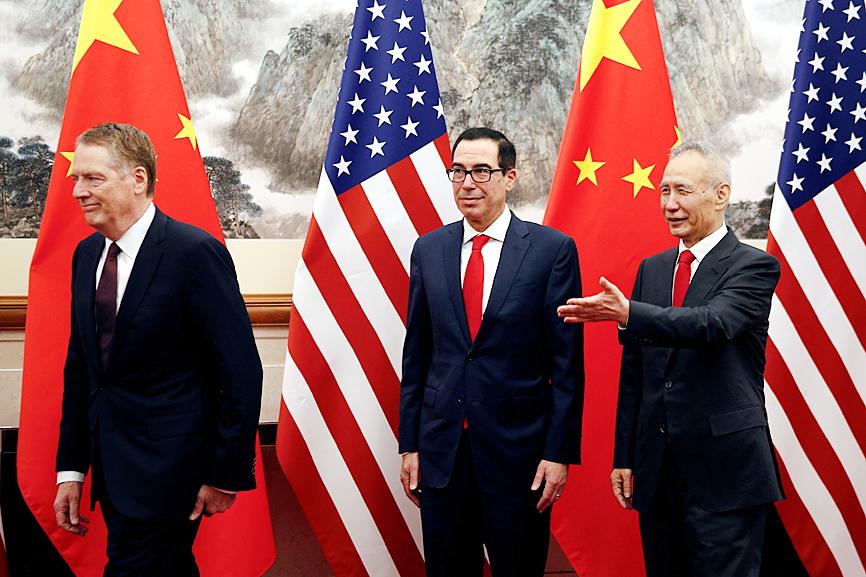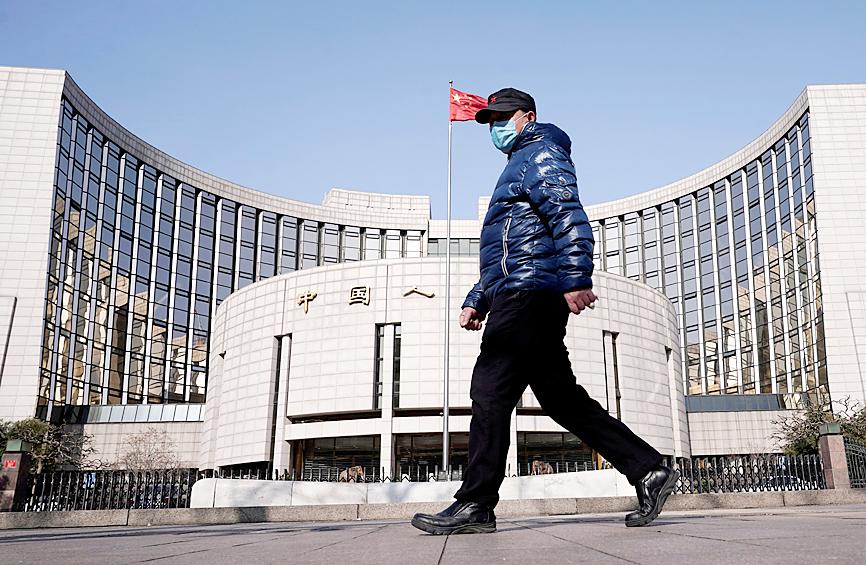The Chinese government on Thursday told smaller, local financial institutions to step up risk management and avoid “excessive” growth, stepping up a campaign to clamp down on a build-up in debt as the economy stabilizes.
At a meeting of the Chinese Financial Stability and Development Committee, Chinese Vice Premier Liu He (劉鶴) called for “zero tolerance” on illicit activities, telling regulators to improve supervision of shareholders and owners of financial institutions, risk concentration, connected transactions and data authenticity, an official statement said.
With the COVID-19 pandemic largely contained and the economy rebounding, policymakers are shifting their focus to deleveraging, a long-standing goal shelved during a trade dispute with the US and further delayed by the pandemic.

Photo: Reuters
Last year’s stimulus pushed debt to almost 280 percent of annual economic output, with banks alone doling out a record 19.6 trillion yuan (US$3 trillion) in cheap credit.
“The committee meeting signals that China will conduct a systematic review of local financial institutions, especially the ones related to local governments, to resolve risks,” said Cao Heping (曹和平), a professor of economics at Peking University.
The People’s Bank of China has also told the nation’s major lenders to curtail loan growth for the rest of this year after a surge in the first two months stoked bubble risks, people familiar with the matter have said.

Photo: Reuters
At a meeting with the central bank on March 22, banks were told to keep new advances this year at roughly the same level as last year.
Over the past three years, the banking regulator has zeroed in on the nation’s about 4,000 small city and rural banks, which are struggling with bad loans and poor corporate governance.
These institutions have amassed one-quarter of total banking assets by the end of last year and their lending growth — fueled by interbank borrowing and shadow financing — has often outpaced bigger rivals.
Confidence in smaller banks was jolted in the middle of 2019, when regulators seized control of a lender in Inner Mongolia — the first such move in two decades — and imposed losses on some creditors.
Authorities have since orchestrated bailouts of two other banks and intervened to quell at least two bank runs by jittery depositors.

Intel Corp chief executive officer Lip-Bu Tan (陳立武) is expected to meet with Taiwanese suppliers next month in conjunction with the opening of the Computex Taipei trade show, supply chain sources said on Monday. The visit, the first for Tan to Taiwan since assuming his new post last month, would be aimed at enhancing Intel’s ties with suppliers in Taiwan as he attempts to help turn around the struggling US chipmaker, the sources said. Tan is to hold a banquet to celebrate Intel’s 40-year presence in Taiwan before Computex opens on May 20 and invite dozens of Taiwanese suppliers to exchange views

Application-specific integrated circuit designer Faraday Technology Corp (智原) yesterday said that although revenue this quarter would decline 30 percent from last quarter, it retained its full-year forecast of revenue growth of 100 percent. The company attributed the quarterly drop to a slowdown in customers’ production of chips using Faraday’s advanced packaging technology. The company is still confident about its revenue growth this year, given its strong “design-win” — or the projects it won to help customers design their chips, Faraday president Steve Wang (王國雍) told an online earnings conference. “The design-win this year is better than we expected. We believe we will win

Chizuko Kimura has become the first female sushi chef in the world to win a Michelin star, fulfilling a promise she made to her dying husband to continue his legacy. The 54-year-old Japanese chef regained the Michelin star her late husband, Shunei Kimura, won three years ago for their Sushi Shunei restaurant in Paris. For Shunei Kimura, the star was a dream come true. However, the joy was short-lived. He died from cancer just three months later in June 2022. He was 65. The following year, the restaurant in the heart of Montmartre lost its star rating. Chizuko Kimura insisted that the new star is still down

While China’s leaders use their economic and political might to fight US President Donald Trump’s trade war “to the end,” its army of social media soldiers are embarking on a more humorous campaign online. Trump’s tariff blitz has seen Washington and Beijing impose eye-watering duties on imports from the other, fanning a standoff between the economic superpowers that has sparked global recession fears and sent markets into a tailspin. Trump says his policy is a response to years of being “ripped off” by other countries and aims to bring manufacturing to the US, forcing companies to employ US workers. However, China’s online warriors